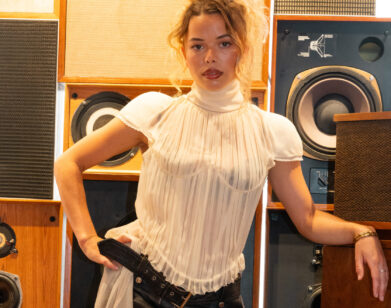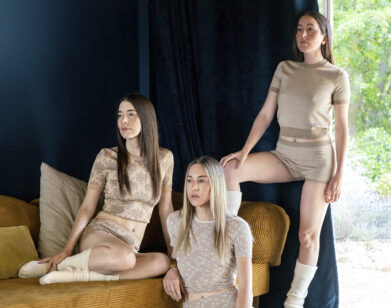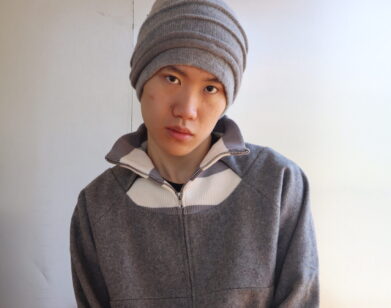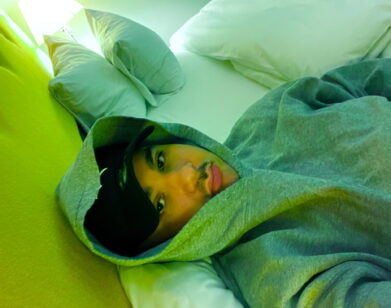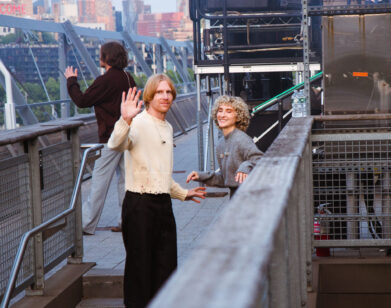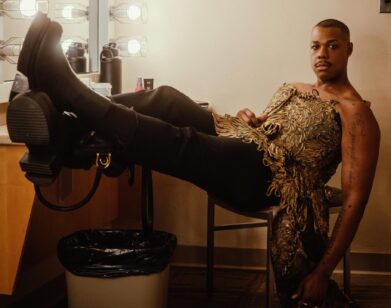The New Saint
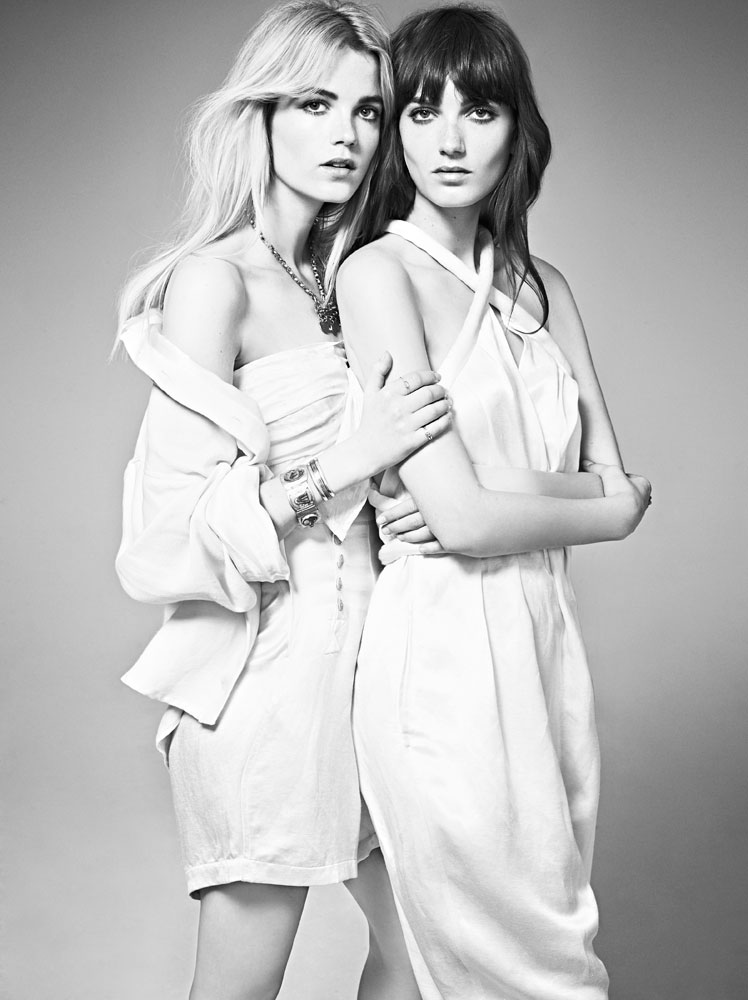
SAY LOU LOU IN NEW YORK, APRIL 2015. PHOTO BY HAO ZENG. STYLING BY DIANNA LUNT/ART DEPT. MAKEUP: CHARLOTTE DAY/SEE MANAGEMENT USING NARS COSMETICS. HAIR: OWEN GOULD/THE WALL GROUP. ON ELEKTRA (LEFT): SHIRT, SHORTS, AND BANDEAU: ELECTRIC FEATHERS. ALL JEWELRY: HORIZONS VINTAGE, BROOKLYN. ON MIRANDA (RIGHT): JUMPSUIT: ELECTRIC FEATHERS.
After first emerging in the music industry in 2012 as Saint Lou Lou, twin sisters Elektra and Miranda Kilbey soon faced legal issues with the band’s name and had trouble finding the right studio to record a proper album. Many failed studio sessions hindered their debut album’s completion, but as the saying goes, good things come to those who wait. Following six singles released via various labels, including Sony, Kitsuné, Columbia, and their own à Deux, Lucid Dreaming was finally released in April. Last week, they announced additional North American fall tour dates, including one at New York’s iconic Bowery Ballroom, and next week they will celebrate their 24th birthdays.
Growing up between Sydney and Stockholm, the Kilbey sisters were no strangers to music, as their father Steve was a longtime member of Australian band The Church. Now, Lucid Dreaming, reflects their wide range of influences (from one country’s culture to another, from one musical genre to another), including rhythmically disco tracks like “Games for Girls,” as well as brooding, melancholic songs like “Julian.” They often mix surrealist and metaphysical lyrics with the effervescence of synths, resulting in a kaleidoscopic soundscape. We spoke with the girls when they were Saint Lou Lou, but decided it was time to catch up again.
DEVON IVIE: I stumbled upon the interview you did for us in 2012. What prompted the name change?
MIRDANDA KILBEY: Our name change was because of legal reasons. There was an artist with a very similar name in Germany who didn’t want us to keep our name. So we went through some legal trouble with her and eventually changed it to Say Lou Lou—which is fine, we’re really happy with the name change. It was time consuming and costly at the time, but looking back it’s something we don’t think about that often.
IVIE: You grew up in Australia and Sweden. Do you feel a deeper connection to one country or the other?
KILBEY: We feel deep connections with both—it would be hard to pick one or the other. I think Stockholm is like a very everyday life connection, and Sydney is more of a holiday, dreamlike type of connection.
IVIE: Growing up in a musical household, were you always intent on becoming musicians?
KILBEY: Until we were 10, we were always singing and dancing and jumping around, thinking that was the only future that existed. It was the only job people we knew had, because all of our uncles and family were in music as well, so that’s what we thought was the “real life.” Then when we became teenagers we were like, “Ugh, that would never happen. That’s too unlikely. We need real jobs.” [laughs] But by the time we were going into adulthood, when we were 19, we realized we actually wanted to be singers, and we really wanted to make this work, so we fell back into it.
IVIE: If you weren’t musicians, what careers do you think you would have instead?
KILBEY: We kind of wanted to be the same thing—something in social or cultural anthropology. Working in culture, or art, or other types of music.
IVIE: What is your writing process like?
KILBEY: Music and melodies come first, and the lyrics come after. We make melodies and then put words to the melodies. Sometimes we have a really strong line that we’re thinking about and want to work, and then make that into a melody, but music is always first—or short chord progressions. When something sparks the idea of a vocal melody, the words come.
IVIE: What would you say is the best and worst thing about working with your sister?
KILBEY: The best thing is that we know each other so well that everything is pretty easy. We spend time together quite naturally and work really hard together, so it goes pretty fast. Writing music together is much easier, I think, than working with other people. We have a connection singing together. On stage we can look at each other and know what’s going on, like if one’s struggling or if one’s having problems with something—everything feels really natural and easy. But on the other hand, we get so tired and bored with each other, and want to kill each other from time to time. It’s hard thinking about if we were working with someone else, you know what I mean? If we were just each other’s best friends, it would be so hard to have a conflict without feeling like your friendship was over. We have conflicts, but it’s not like we can stop being sisters—we always will be. There’s not really anything that can come between us.
IVIE: So, about the new album, what inspired the name Lucid Dreaming?
KILBEY: From the early days we always felt that Lucid Dreaming would be the name of the first album. We always loved the concept of lucid dreaming. Basically it’s about being able to not control your dreams, but you’re aware that you’re sleeping and you can somehow change the course of your dream. A lot of scientists and a lot of people work with it, especially with how to treat nightmares. We’ve always been interested in it. We would try to practice it when we were children because we had a lot of nightmares. Living a dream of being aware that you’re dreaming is a very beautiful concept, and that fits into how we’ve written the album, and how to connect all of the tracks together.
IVIE: Have you heard of the song “Lucid Dreams” by Franz Ferdinand? It’s this eight-minute song from their third album and fits nicely into the ideas you just talked about.
KILBEY: No, we haven’t. Does the song portray the experience of a lucid dream?
IVIE: It does.
KILBEY: I think some of the tracks on our album have those sequences as well. There’s a sense of the title in every track—I can’t explain how, but I think if you listen to the tracks from start to finish, you would get the feeling. We’re really happy with the name.
IVIE: Where did you record the album?
KILBEY: The writing took place in many different places—Stockholm, London, and a little bit in Los Angeles. I think in London the majority of the writing was done. A lot of the demo vocals that we loved so much and loved the essence of were done in Stockholm and London.
IVIE: What themes did you choose to explore in Lucid Dreaming, aside from the obvious?
KILBEY: We had been working toward getting our teenage years up and out of our system. We’re completing the diary, somehow, or completing the first chapter of the biography, and getting those feelings we’ve been carrying around out of our system to move on to other things. Also a lot of unrequited love, and a lot of questions—a lot of questioning, “Who am I? Who are we? What are we doing?” A lot of it is teenage angst, to be quite honest. We try to write about more mature things, but we also end up back to the same place—like how you felt at that particular moment, or the yearning and wanting to be somewhere else. I think that’s where we’ve ended up on a lot of occasions.
IVIE: Looking back, what were the biggest challenges you experienced while making the album?
KILBEY: Not overworking things. We had a hard time saying, “This song is done, let’s move on,” and not going back to pick at and change things. But that’s an easy trouble. Also, there was trouble confining the album to one place—we’ve been doing it over a long period of time in many different places. We felt at times that things were quite scattered. But looking back, I think we’re both happy the way we did the album, because I don’t think we’ll do it that way ever again. It was a very interesting and good learning process for the future.
IVIE: How would you say your musical style has evolved since you released your first track in 2012?
KILBEY: We’ve developed in the fact that we’ve been shaping ourselves for so long by learning so much, writing so much, and performing so much—even getting more comfortable with our voices as a live band. Looking back, the live performing aspect has influenced us a lot the past few years, like how things work on stage and how things sound on stage, and then taking that into the studio and trying to get that same feeling recorded. We’ve also come to a place where we’ve added a slight, slight, slight bit of disco into what we’re doing. I think that’s how we’ve evolved a bit—moving away from the dream-wave sound into a more rhythmic place.
LUCID DREAMING IS OUT NOW. FOR MORE INFORMATION ON SAY LOU LOU AND THEIR FALL TOUR DATES, VISIT THE GIRLS’ WEBSITE.

